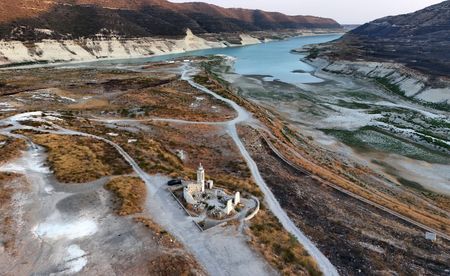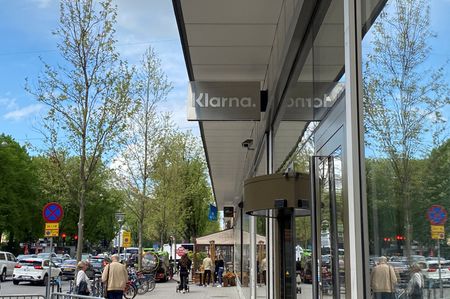By Michele Kambas
KOURIS RESERVOIR, Cyprus (Reuters) -Saint Nicholas church in the hills above Limassol, normally submerged in the Kouris Reservoir, offers a stark glimpse of the worsening water crisis in Cyprus. The belfry is fully exposed and the building is surrounded by parched earth.
Lying at the far east of the Mediterranean, Cyprus has always lived with drought. But climate change has turned dry spells into a permanent challenge and authorities are increasingly turning to desalination to meet rising water needs.
Annual rainfall has dropped an estimated 15% in the past 90 years, while temperatures in Nicosia have risen 1.8 degrees Celsius in the past century — double the global average according to official data.
As of September 1, the island’s reservoirs were just 14.7% full.
Demand for water has surged three-fold since 1990 because of population growth and a surge in tourism, leaving Cyprus with a constant water deficit. The country has a population of just under 1 million, and nearly 3 million tourists visit annually.
In 2023 the deficit reached 66 million cubic metres — more than 26,000 Olympic-sized pools – said Yianna Oikonomidou, senior executive engineer at the water development department.
“It really shows how big the problem is, and why we are trying to cover this deficit with non-conventional sources such as desalination, and also re-use of treated water which fully aligns with the principles of a circular economy,” she said.
Desalination was first introduced in Cyprus in 1997 and now covers about 70% of drinking water needs. Mobile plants from the United Arab Emirates were installed this summer, with authorities planning more next year. Ultimately, the government wants desalination to meet all household and business needs.
“Our aim is to end reliance on weather,” said Maria Panayiotou, minister for Agriculture, Environment and Natural Resources. The present administration, she said, adopted a policy to keep desalination units running whatever the season.
“Rain or no rain, Cyprus must cover its needs in water supply and we can do that only by utilising technology available to us, improving our networks and developing a water conscience to minimise wastage.”
But as the desalination plants hum along the coast, some criticise the reliance on seawater.
“It is very expensive … and if you are not careful, can cause a lot of damage,” warned MP Charalambos Theopemptou, chair of parliament’s Environment Committee.
He said fishermen have complained of depleted stocks and “no life” in areas where brine from desalination is discharged. The Agriculture Ministry insists monitoring has found no adverse impact.
Scientists warn the island faces deeper risks. Farming practices, including growing water-intensive crops, are hastening desertification.
“Apart from Troodos and Pentadaktylos (mountain ranges), all other areas are potentially desertified,” said Michael Loizides, a chemical and environmental engineer at the AKTI Project and Research Centre.
His group is involved in an EU-funded pilot seeking sustainable ways to prevent land degradation, such as composting to restore soil and improve water retention.
“Cyprus is in a devastating situation. This means we have to be creative and innovative,” he said.
(Reporting by Michele KambasEditing by Frances Kerry)















